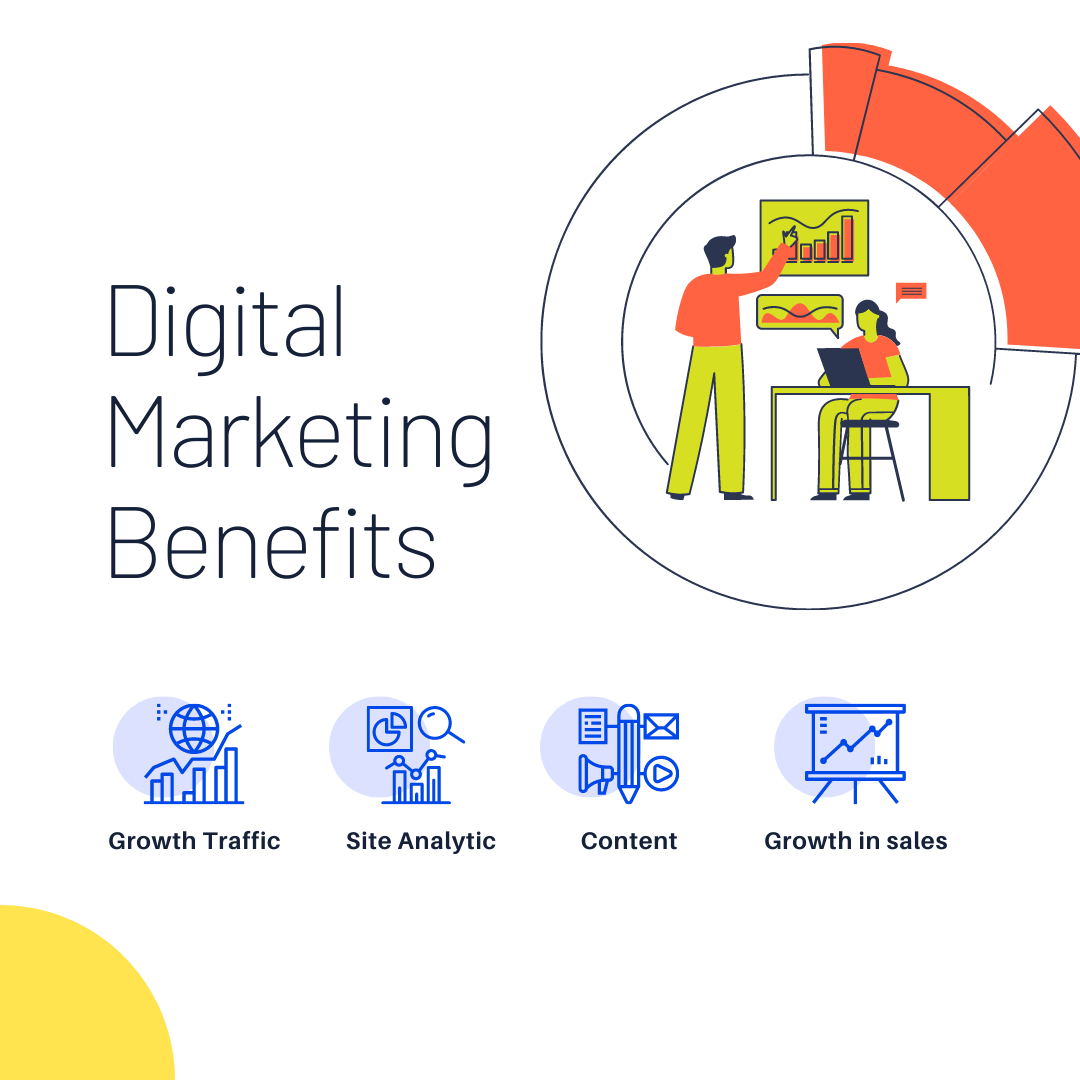There are various Benefits of Digital Marketing for Small Businesses.
In today’s digital age, businesses of all sizes are recognizing the importance of having a strong online presence. Digital marketing has emerged as a powerful tool that can help small businesses compete with larger corporations on a level playing field. In this article, we will explore the numerous benefits that digital marketing offers to small businesses, empowering them to reach their target audience effectively and achieve sustainable growth.

1. Introduction: The Growing Significance of Digital Marketing
In today’s digitally connected world, consumers are increasingly relying on the internet to discover products and services. This shift in consumer behavior has made digital marketing an essential component of any business strategy. Digital marketing encompasses various online channels, such as search engine optimization (SEO), social media marketing, content marketing, email marketing, and paid advertising. By utilizing these channels effectively, small businesses can reap significant benefits and gain a competitive edge.
2. Cost-Effectiveness and Increased ROI
One of the primary advantages of digital marketing for small businesses is its cost-effectiveness. Traditional marketing methods, such as print advertisements or television commercials, can be expensive and may not yield the desired results. On the other hand, digital marketing allows businesses to target their audience precisely, reducing marketing costs and maximizing return on investment (ROI). With proper planning and execution, small businesses can achieve substantial growth without breaking the bank.
3. Targeted Reach and Better Customer Segmentation
Digital marketing provides small businesses with the ability to reach their target audience with precision. Through techniques like SEO and social media targeting, businesses can tailor their marketing messages to specific demographics, interests, and behaviors. This targeted approach ensures that marketing efforts are directed toward those who are most likely to convert into customers. By understanding their audience better and catering to their needs, small businesses can drive higher engagement and conversion rates.
4. Enhanced Brand Awareness and Credibility
Establishing a strong brand presence is crucial for the success of any business. Digital marketing offers small businesses an opportunity to enhance their brand awareness and credibility. Through content marketing, social media engagement, and influencer partnerships, businesses can create a consistent brand image and communicate their unique value proposition to their target audience. Building a reputable brand not only attracts new customers but also fosters trust and loyalty among existing ones.
5. Improved Customer Engagement and Interaction
Digital marketing enables small businesses to engage with their customers in real time and on a personal level. Social media platforms, email newsletters, and live chat functionalities allow businesses to communicate directly with their audience, address their queries, and provide timely support. By fostering a two-way conversation, businesses can gain valuable insights, build stronger relationships, and improve overall customer satisfaction.
6. Measurable Results and Data Analytics
Unlike traditional marketing methods, digital marketing provides measurable results and data analytics. Through various tools and platforms, small businesses can track the performance of their marketing campaigns in real time. They can measure key metrics such as website traffic, conversion rates, click-through rates, and customer engagement. This data-driven approach allows businesses to identify what works and what doesn’t, enabling them to make data-backed decisions and optimize their marketing strategies for better results.
7. Increased Sales and Revenue Generation
The ultimate goal of any business is to increase sales and generate revenue. Digital marketing plays a pivotal role in driving conversions and boosting sales for small businesses. By implementing effective conversion rate optimization (CRO) strategies, businesses can optimize their website and landing pages to encourage visitors to take the desired action, such as making a purchase or submitting a lead form. Furthermore, digital marketing techniques like email marketing and remarketing can help nurture leads and guide them through the sales funnel, ultimately leading to increased revenue.
8. Competitive Advantage and Leveling the Playing Field
Digital marketing levels the playing field for small businesses, allowing them to compete with larger corporations. With a well-planned digital marketing strategy, small businesses can target niche markets, differentiate themselves from competitors, and carve out a unique space in the industry. By leveraging their agility and creativity, small businesses can gain a competitive advantage and establish themselves as industry leaders in their respective domains.
9. Access to Global Markets and New Opportunities
One of the significant advantages of digital marketing is its ability to transcend geographical boundaries. Small businesses can leverage digital channels to expand their reach beyond their local markets and tap into global audiences. With the right strategies in place, businesses can enter new markets, establish partnerships with international vendors, and explore new growth opportunities. Digital marketing opens doors to a world of possibilities for small businesses, enabling them to expand their horizons and thrive in the global marketplace.
10. Improved Customer Support and Satisfaction
Excellent customer support is the cornerstone of any successful business. Digital marketing provides small businesses with tools and platforms to deliver exceptional customer service. Social media platforms and chatbots allow businesses to respond to customer queries promptly, address concerns, and provide personalized solutions. By prioritizing customer support, businesses can enhance customer satisfaction, foster positive word-of-mouth, and build long-term customer loyalty.
11. Flexibility and Adaptability to Market Trends
The digital landscape is constantly evolving, with new technologies and trends emerging regularly. Digital marketing equips small businesses with the flexibility and adaptability to stay ahead of the curve. Whether it’s adopting new social media platforms, incorporating emerging technologies like artificial intelligence (AI) and virtual reality (VR), or embracing innovative marketing techniques, small businesses can leverage digital marketing to adapt to changing consumer behaviors and market dynamics.
12. Integration with Traditional Marketing Strategies
Digital marketing doesn’t necessarily replace traditional marketing strategies; instead, it complements them. Small businesses can integrate their digital marketing efforts with traditional methods to create a holistic marketing approach. For example, businesses can use QR codes in print advertisements to drive traffic to their website or promote their social media handles through radio or TV commercials. By combining the strengths of both digital and traditional marketing, small businesses can amplify their brand reach and impact.
13. Building Long-Term Customer Relationships
Digital marketing facilitates the building of long-term customer relationships. Through personalized email marketing campaigns, loyalty programs, and customer feedback initiatives, small businesses can engage with their customers beyond the initial purchase. By nurturing these relationships, businesses can foster customer loyalty, encourage repeat business, and benefit from positive customer advocacy, ultimately driving sustainable growth.
14. Developing Trust and Loyalty
Trust and loyalty are crucial for the success of any business. Digital marketing provides small businesses with opportunities to develop trust and loyalty among their target audience. By consistently delivering valuable content, engaging with customers on social media, and providing exceptional customer experiences, businesses can establish themselves as trusted advisors and preferred brands. Trust and loyalty are the foundation of long-term customer relationships and can significantly impact a small business’s growth trajectory.
15. Conclusion
In today’s digital landscape, small businesses cannot afford to ignore the benefits of digital marketing. From cost-effectiveness and targeted reach to increased brand awareness and customer engagement, digital marketing offers a plethora of advantages that can propel small businesses toward success. By embracing digital marketing strategies and staying abreast of the latest trends, small businesses can overcome limitations and thrive in a competitive business environment.
Frequently Asked Questions (FAQs)
Q: How can digital marketing benefit small businesses?
A: Digital marketing offers cost-effectiveness, targeted reach, improved customer engagement, and increased sales for small businesses, among other benefits.
Q: Can small businesses compete with larger corporations through digital marketing?
A: Yes, digital marketing levels the playing field and allows small businesses to compete effectively with larger corporations.
Q: Is digital marketing suitable for all types of small businesses?
A: Yes, digital marketing can be tailored to suit the unique needs and goals of different small businesses across various industries.
Q: What are some key digital marketing strategies that small businesses can implement?
A: Small businesses can utilize strategies such as SEO, social media marketing, content marketing, email marketing, and paid advertising to achieve their marketing objectives.
Q: How can small businesses measure the success of their digital marketing campaigns?
A: Small businesses can measure success through key metrics such as website traffic, conversion rates, click-through rates, and customer engagement using various analytical tools and platforms.


